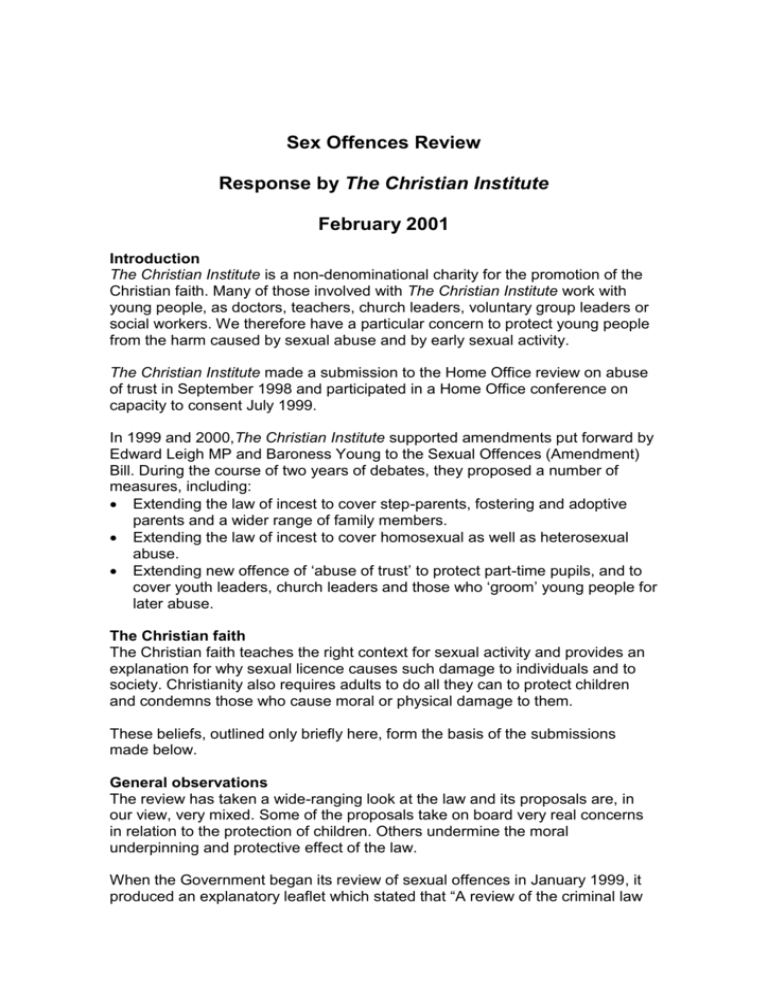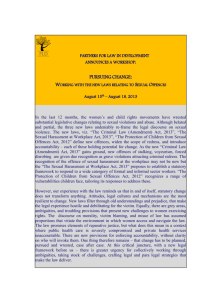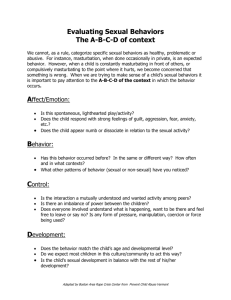
Sex Offences Review
Response by The Christian Institute
February 2001
Introduction
The Christian Institute is a non-denominational charity for the promotion of the
Christian faith. Many of those involved with The Christian Institute work with
young people, as doctors, teachers, church leaders, voluntary group leaders or
social workers. We therefore have a particular concern to protect young people
from the harm caused by sexual abuse and by early sexual activity.
The Christian Institute made a submission to the Home Office review on abuse
of trust in September 1998 and participated in a Home Office conference on
capacity to consent July 1999.
In 1999 and 2000,The Christian Institute supported amendments put forward by
Edward Leigh MP and Baroness Young to the Sexual Offences (Amendment)
Bill. During the course of two years of debates, they proposed a number of
measures, including:
Extending the law of incest to cover step-parents, fostering and adoptive
parents and a wider range of family members.
Extending the law of incest to cover homosexual as well as heterosexual
abuse.
Extending new offence of ‘abuse of trust’ to protect part-time pupils, and to
cover youth leaders, church leaders and those who ‘groom’ young people for
later abuse.
The Christian faith
The Christian faith teaches the right context for sexual activity and provides an
explanation for why sexual licence causes such damage to individuals and to
society. Christianity also requires adults to do all they can to protect children
and condemns those who cause moral or physical damage to them.
These beliefs, outlined only briefly here, form the basis of the submissions
made below.
General observations
The review has taken a wide-ranging look at the law and its proposals are, in
our view, very mixed. Some of the proposals take on board very real concerns
in relation to the protection of children. Others undermine the moral
underpinning and protective effect of the law.
When the Government began its review of sexual offences in January 1999, it
produced an explanatory leaflet which stated that “A review of the criminal law
on sex offences is long overdue… Much of the law dates from a hundred years
ago and more, when society was very different.”
We would be very cautious about changing the law on sexual offences merely
for the sake of change. A law is not wrong or bad simply because it is old.
Changes should only be made where there is a demonstrable need.
There has been no great popular campaign for wholesale change to the laws on
sex offences. Any legislative proposals which emerge from this review
should focus on where there is a clear need to provide greater protection
and to ensure justice for victims and perpetrators of sexual crimes.
Necessary discrimination
A policy paper produced by the Home Office early on in the Sex Offences
Review said that, “the criminal law should not discriminate unnecessarily
between men and women nor between those of different sexual orientation”.
The fact is that some of the new offences proposed by the review do
discriminate and quite rightly. With good reason they discriminate against men
since they are overwhelmingly the greatest perpetrators of sexual offences. But
at the same time the proposals specifically set out to eradicate any
discrimination between homosexual and heterosexual acts, even though there
are grounds of necessity which justify the distinction.
The propensity of homosexual men to engage in sexual activity in public is one
of those grounds of necessity. The offences of buggery and gross indecency
make specific reference to the fact that these acts cannot be lawful when they
take place in a public toilet. No such provision exists for heterosexual offences
simply because heterosexual activity very rarely takes place in such a setting,
whereas it is common amongst homosexual men.1
The proposal to abolish gross indecency [para.6.6.10] is therefore a mistake.
The real priority
Any attempts at bringing in new legislation on sex offences must focus
overwhelmingly on the problem of child sex abuse. We welcome the fact that
the review does suggest new offences to make it easier to prosecute child
abusers who carry out acts falling short of rape. However, much more needs to
be done to tackle the stunning fall in prosecutions of child sex offenders.
In 1998 the Home Office published a major report on sexual offences against
children by Professor Don Grubin. Exact figures regarding the incidence of sex
offending against children are difficult to calculate for obvious reasons. But
official police figures indicate the true level of child sexual abuse may be as high
as 72,600 cases a year.2
1
See Weatherburn P et al, The Sexual Lifestyles of Gay and Bisexual Men in England and Wales, HMSO, 1992, page
20, which found that most homosexual men had casual sexual partners. Of those over one quarter (27%) had met at
least one in a 'cottage' (public lavatory), over one quarter (26%) had met at least one at a cruising ground, just under
one quarter (24%) had met at least one in a sauna and 8% had met a casual partner in the street.
2
Grubin, Prof D, Sex offending against children: understanding the risk, Home Office, Police Research Series, Paper
99, 1998, page 12
Setting The Boundaries - Response of The Christian Institute
Page 1 of 7
Table 1 of Professor Grubin’s report (below) shows that “the number of cautions
or convictions for sexual offences against children has been declining steadily in
recent years.”3
Right across the board, convictions for sexual offences against children have
been falling year after year. The report shows that from 1985 to 1995
convictions for the six most serious sexual offences against children fell by
31%.
Professor Grubin points out that reports of gross indecency with children 14 and
under (girls and boys) more than doubled from 633 to 1,287 over the ten year
period to 1995, yet convictions declined.4 There is clearly a serious problem
with enforcement of laws against child sex offences.
Summary of the review’s proposals
These are our summaries of some of the main conclusions of Setting the
Boundaries, along with our comments:
Recommendations 1-9
● Recommendation: The review says that the offence of rape should be
extended to cover forced oral sex and offences against transsexuals 5 whilst
a new offence of sexual assault by penetration would cover other forms of
penetration without consent.6
● Recommendation: The definition of consent should be defined by reference
to ‘free agreement’.7 This is an attempt to cover more situations where
3
Ibid page 4
Ibid page 4, see also Hansard, House of
Commons, 9th March 1999, cols 129-130 wa
5
Recommendation 1, Para 2.8.5
6
Recommendation 3, Para 2.9.2
7
Recommendation 4, Para 2.10.5
4
Setting The Boundaries - Response of The Christian Institute
Page 2 of 7
coercion is used to obtain sex from a victim. It is suggested that the law
should also allow a conviction on the grounds of recklessness where the
perpetrator ‘could not care less about consent’.8
Comment: Any new definitions of rape and of consent will probably create as
many problems as they solve. Furthermore, by equating rape to other forms of
sexual attach such as forced oral sex, the new offence risks downgrading the
seriousness of actual rape.
Juries may also be discouraged from convicting if they don’t feel that the act for
which someone is prosecuted is as serious as actual rape. Alongside a new
offence of penile penetration, rape should be retained as a separate
offence in order to allow a distinction between rape and other forms of
penile penetration. However, the range of penalties available for the two
offences should be the same.
Recommendations 10-18
● Recommendation: A new offence of sexual assault should be introduced to
cover sexual touching (i.e. behaviour that a reasonable bystander would
consider to be sexual) where the victim does not consent.9
Comment: Drafting of the offence would have to be done very carefully to make
sure that courts found it easier to convict rather than more difficult. The danger
is that the proposed definition is so vague that courts would interpret it very
narrowly.
●
Recommendation: As a matter of public policy the age of legal consent
should remain at sixteen.10 The law should also state that children below
thirteen can never effectively consent to sexual activity. 11
Comment: It is vital that the law states that children are not legitimate objects of
sexual activity. Legally, all those under 18 are children. Our view is that the age
of consent should be raised to 18 so that no-one may have sex with a person
who is still a child. The review was specifically told that lowering the age of
consent below sixteen was not an option it could consider, although groups
such as Outrage have lobbied for it. The review’s apparent support for the age
of consent at 16 is, however, undermined by its later recommendation12 that
children who engage in consensual sexual activity together when they are both
under sixteen, should not be subject to criminal intervention. This would
effectively legalise under-age sex.
Recommendations 19-29
● Recommendation: There should be a new offence of adult (over 18) sexual
abuse of a child (under 16)13. There would be no time limit on this offence,
so that victims who took years to come forward could do so in the
8
Recommendation 8, Para 2.12.6
Recommendation 10, Para 2.14.4
10
Recommendation 17, Para 3.5.7
11
Recommendation 18, Para 3.5.11
12
Recommendation 28, Para 3.9.19
13
Recommendation 19, Para 3.6.5
9
Setting The Boundaries - Response of The Christian Institute
Page 3 of 7
knowledge that a prosecution could still be brought.14 This would be
complemented by new offence of persistent sexual abuse of a child.15
Comment: This is a most welcome proposal. It recognises that sex between
adults and children is wrong and very damaging. It should be accompanied
by guidance to the police requiring them to resume prosecuting offences
under the existing age of consent laws. This includes cases where sexual
advantage is taken of a person who is only just under the age of consent.
Prosecutions under the existing laws have been declining at an alarming rate.
This trend must be reversed.
●
Recommendation: Those who give help or advice to children in matters of
‘sexual health’ should not be regarded as aiding and abetting a criminal
offence, nor should the children who seek such advice.16
Comment: It is alarming to think that some of those engaged in this kind of
work might actually be committing a criminal offence. The answer is for them to
make sure their actions are not criminal, rather than giving them an exemption.
●
Recommendation: There should be a new offence of sexual activity between
minors to cover 16 and 17 year-olds where the other party is under 16. The
review wants “appropriate non-criminal interventions” for those under sixteen
engaging in mutually agreed under-age sex.17
Comment: Both of these measures downplay the seriousness of teenage
sexual experimentation. As well as the risk of pregnancy and sexually
transmitted diseases, there is a serious cost in terms of emotional damage to
young people who regret their early sexual experiences. Girls in particular tend
to be taken advantage of by boys simply concerned with their own sexual
gratification. There is also evidence linking early intercourse with adult
promiscuity. These proposals must be rejected. The law should send an
unambiguous signal of the unacceptability of childhood sex.
●
Recommendations 30-43
Recommendation: There should be a new offence of breaching a
relationship of care. This would prohibit sexual relationships between a
patient in medical care or residential care and a member of staff, as well as
between doctors and patients. However a “pre-existing relationship” would
constitute a defence.18
Comment: These measures are welcome, as far as they go. However, it is a
mistake to build in a wide defence for pre-existing relationships since this will
simply provide abusers with an automatic defence. Many will simply claim that a
relationship was already in existence before they came within the reach of the
new offence. It may be difficult to adduce evidence to contradict this defence,
especially where the victim is still sympathetic to the abuser.
14
Recommendation 20, Para 3.6.6
Recommendation 25, Para 3.7.3
Recommendation 26, Para 3.8.1
17
Recommendation 28, Para 3.9.19
18
Recommendations 32 and 33, Paras 4.8.15 and 4.8.17
15
16
Setting The Boundaries - Response of The Christian Institute
Page 4 of 7
Those in pre-existing sexual relationships (other than in the very narrow
circumstances given in Para 4.8.17) should simply be required to end the
relationship, or change their professional arrangements so that they are no
longer in a position of trust towards that sexual partner.
●
Recommendation: A new offence of familial sexual abuse should replace
incest. Uncles and aunts related by blood would be covered, as would stepparents, foster-parents and adoptive parents. The offence would also extend
to anyone living in the household in a position of trust or authority. Sexual
relations between adoptive siblings should be prohibited until age 18.19
Comment: The law of incest must remain. Sex within the family is a particularly
grotesque abuse of trust and should be recognised for what it is. ‘Incest’ is a
word which people understand and which communicates the gravity of the
offence. The law of incest is explicitly based upon the Judeo-Christian ethic
(See Leviticus chapter 18 verses 6 to 16) and is concerned to preserve the
sanctity of family ties. It is not designed primarily to protect the gene pool
(although it does, of course, have this side effect). Incest should be retained
and extended to cover step-relations. A separate offence of family sexual abuse
in addition to this, to cover the wider family, would be welcome.
●
Recommendations 44-62
Recommendation: The laws on buggery and gross indecency should be
repealed. Sexual acts in public should be covered by a single offence
covering homosexual and heterosexual acts.20
Comment: We oppose the repeal of buggery and gross indecency. There are
moral and medical differences between penetration of the vagina and
penetration of the anus. There is also a difference between heterosexual activity
and homosexual activity. These differences have long been recognised in law,
and by the majority of people.
The legal term ‘buggery’ should be retained. In 1984 the Home Office’s Criminal
Law Revision Committee produced its fifteenth report21. We would not agree
with many of its proposals. However, in relation to its proposal to retain the word
‘buggery’ for the offence of anal intercourse with a girl under age, it said this:
“There has been little adverse comment on our use of the word “buggery” to
describe the proposed offence of anal intercourse with a girl under age. The
word has been in use in the law for centuries. It undoubtedly has a
condemnatory flavour, be we think that that is appropriate for the offence we are
proposing.”
In relation to sexual acts in public, we would welcome any measure to toughen
up the law, regardless of the nature of those acts. If the proposal were to
introduce a heterosexual equivalent of gross indecency, we would welcome it.
19
Recommendations 35 to 39, Paras 5.5.6, 5.5.7, 5.5.13, 5.6.2 and 5.6.3
Recommendation 45, Para 6.6.10
21
Cmnd 9213
20
Setting The Boundaries - Response of The Christian Institute
Page 5 of 7
We would reiterate the comments about homosexual offences made in the
introduction. Historically, the specific problem of homosexual acts in public
merited specific laws to tackle it. There is nothing wrong with a law which
tackles a clearly defined problem, even if it gives the appearance of
discriminating against certain types of activity.
●
Recommendation: Trafficking of persons for sexual exploitation and sexual
exploitation of under eighteens should also be criminalised.22
Comment: This is a very welcome response to longstanding concerns.
●
Recommendation: There should be a further review of the law on
prostitution.23
Comment: This is a very ominous proposal. It opens the door to those who
wish to decriminalise prostitution. Whilst we agree strongly with efforts to target
more of the pimps and users of prostitutes, it is wrong to pretend the prostitutes
themselves are blameless. Everyone involved in prostitution should face
criminal penalties. It is a serious public nuisance and criminal penalties and
genuine efforts to enforce the law are the only appropriate response.
●
Recommendation: There should be a new public order offence but only
where the person knew or should have known that his sexual behaviour in
public was likely to cause distress, alarm or offence.24
Comment: We are totally opposed to this proposal. It would probably legalise
sex in public where the perpetrators did not realise they could be seen (such as
in a cornfield). It imposes a high burden of proof by requiring distress, alarm or
offence. Presumably the perpetrators could argue in their defence that those
who observed them were not really distressed or offended. It is difficult to
imagine how the victims would prove otherwise and they should not be required
to go through such indignity. The presence of sex in public should be assumed
to cause offence and should always be illegal.
There have been high profile cases of sex in public going unpunished. The
Home Office should issue guidance to police requiring them to enforce the
existing public order offences against those who engage in sexual acts in
public. As stated earlier, if there were a proposal for a heterosexual equivalent
of gross indecency, where any public element or the involvement of a group of
people made the act illegal, we would support such a proposal.
The Christian Institute
February 2001
22
Recommendation 49, para 7.5.14
Recommendation 53, para 7.8.3
24
Recommendation 56, para 8.4.11
23
Setting The Boundaries - Response of The Christian Institute
Page 6 of 7







